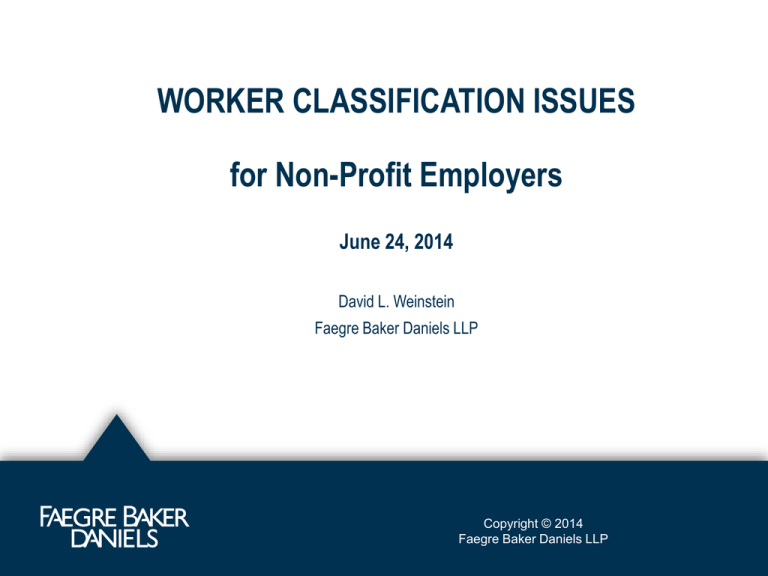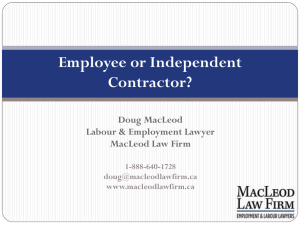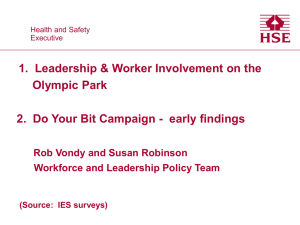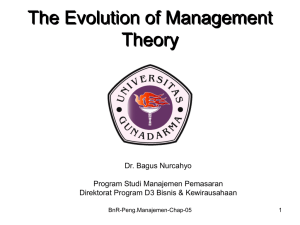worker classification issues for non-profit employers
advertisement

WORKER CLASSIFICATION ISSUES for Non-Profit Employers June 24, 2014 David L. Weinstein Faegre Baker Daniels LLP Copyright © 2014 Faegre Baker Daniels LLP For-Profit v. Non-Profit Employers There are few differences between the employment-related legal obligations of for-profit employers and non-profit employers. Few administrative agencies, courts, judges or juries will decide employment claims in your company’s favor merely because of its status as a non-profit employer. 2 Most Employment Laws Governing For-Profit Employers Apply Equally to Non-Profit Employers “At-will” employment provides the same limited protection to both forprofit and non-profit employers. Non-profit employers are subject to the same or similar obligations as for-profit employers regarding: Unemployment Insurance Benefits (similar) Workers Compensation Benefits (similar) Discrimination Prohibition Laws (same) Employee Benefit Laws (same) Safety and Health Laws (same) Wage-Hour Laws (same) Classification of Workers (same) 3 Unemployment Benefits and Non-Profit Employers Myth: Non-profit employers are not subject to the unemployment insurance system – FALSE! Non-profit employers can register with the Illinois Department of Employment Security (“IDES”) to become a “reimbursable employer” and pay the full amount of each valid claim as it is made. Alternatively, non-profit employers can register with IDES and pay quarterly contributions – the same as for-profit employers. 4 Workers Compensation and Non-Profit Employers Myth: Non-profit employers are not subject to the workers compensation system – FALSE! Non-profit (and for-profit) employers can apply with the Illinois Workers Compensation Commission to self-fund workers compensation claims. Alternatively, non-profit employers can purchase workers compensation insurance – the same as for-profit employers. 5 Worker Misclassification Governmental Agencies have begun unprecedented crack down on independent Contractor vs. Employee Classification. Employee-side lawyers file more worker misclassification lawsuits than discrimination suits. 6 Why Does Worker Classification Matter? Proper classification determines a company’s obligations for Minimum wage and overtime requirements Payroll taxes Benefit plan eligibility Unemployment insurance contributions Immigration documentation Workplace discrimination Labor organizing Occupational health and safety compliance Federal Agencies (IRS, DOL) estimate annual tax loss in billions. State Agencies (Revenue, Unemployment) project annual tax loss in millions. 7 What Determines Whether a Worker is Properly Classified as an Independent Contractor? No universal test. Satisfying standards of one government agency (e.g., IRS) is not a defense to violating more stringent standards of another agency (e.g., IDES). Key factors generally are: Behavioral Control Financial Control (“Economic Realities”) Worker’s Relationship with Company 8 IRS Factors (Rev. Rul. 87-41) to Determine Independent Contractor Status: Let’s Play 20 Questions 1. 2. 3. 4. 5. Is the worker required to follow the company’s instructions? Does the company provide training to accomplish the work? Are the worker’s services integrated into the company’s regular business? Does the company require the worker to perform services personally, as opposed to assigning work to others? Does the company hire, supervise and pay the workers’ assistants? 9 IRS Factors (Rev. Rul. 87-41) to Determine Independent Contractor Status: Let’s Play 20 Questions (continued) 6. 7. 8. 9. 10. Is there a continuing relationship between the company and the worker? Does the company set the worker’s hours? Does the company require the worker to work full-time? Does the worker work at the employer’s place of business? Does the company set the order or sequence of the worker’s work? 10 IRS Factors (Rev. Rul. 87-41) to Determine Independent Contractor Status: Let’s Play 20 Questions (continued) 11. 12. 13. 14. 15. Is the worker required to provide oral or written status reports to the company? Is the worker paid by the hour, week or month, rather than upon completion of the project? Is the worker reimbursed for business or travel expenses? Does the company provide the worker with tools and material? Has the worker made a significant investment in performing the services? 11 IRS Factors (Rev. Rul. 87-41) to Determine Independent Contractor Status: Let’s Play 20 Questions (continued) 16. 17. 18. 19. 20. Can the worker realize a profit or loss? Does the worker work for more than one company at a time? Does the worker make his or her services available to the general public? Does the company have the unilateral right to discharge the worker? Does the worker have the right to terminate the relationship without being liable under the contract? 12 Unemployment Insurance Statutory Factors for Independent Contractor Classification It’s as “simple” as A-B-C (e.g., 820 ILCS 185/1-999)*: A. Whether the worker is free from control in performing services, both by contract term and in fact B. Whether the services are outside the company’s usual business and performed off premises C. Whether the worker is engaged in an independent trade, occupation, profession or business – and providing services to more than one company Any doubt is resolved in favor of classifying the worker as an employee. * The ABC (or A and C) test has been adopted in Alaska, Arkansas, Colorado, Connecticut, Delaware, Georgia, Hawaii, Idaho, Illinois, Indiana, Louisiana, Maine, Maryland, Massachusetts, Nebraska, New Hampshire, New Jersey, New Mexico, Oregon, Pennsylvania, South Dakota, Tennessee, Utah, Vermont, Virginia and West Virginia. 13 Classification of Interns and Volunteers – Federal and State Wage-Hour Department of Labor View Interns and Volunteers as Employees Unless: 1. The internship/volunteer experience is similar to training in a formal educational environment. 2. The internship/volunteer experience primarily benefits the intern/volunteer, and not the employer. 3. The intern/volunteer does not displace/replace regular employees. 14 Classification of Interns and Volunteers – Federal and State Wage-Hour Department of Labor View Interns and Volunteers as Employees Unless: 4. The employer derives no immediate advantage from activities of the intern/volunteer. 5. The intern/volunteer is not necessarily entitled to a job after the end of the experience. 6. The intern/volunteer understands he/she is not entitled to wages. 15 Exceptions to Intern/Volunteer Classification Rules Are Permitted Only If: An employer is a religious organization and the intern/volunteer does primarily religious activities. An employer is a local, state or federal governmental unit. 16 What Can Your Company Do to Limit Exposure for Worker Misclassification? Audit all workers’ current classifications and assess risks. Hire workers as employees or through staffing agencies. Engage workers as independent contractors and intern/volunteers only after thorough analysis. 17 Thorough Analysis Includes: Before engaging an Independent Contractor, confirm the contractor has - - IRS-assigned Federal Employee Identification Number (FEIN), not a social security number. Workers compensation insurance certificate of coverage. Business-related information: Business name, listings, website and e-mail address, telephone other than cellular number, client references/lists. 18 Thorough Analysis Includes: Before engaging an Intern/Volunteer, confirm your Company has - - Insurance coverage: workers compensation and comprehensive general liability. 19 Remember: All doubts about Worker Classification likely will be resolved in favor of finding the worker is an employee, not an independent contractor or an intern/volunteer. 20 Questions? 21





